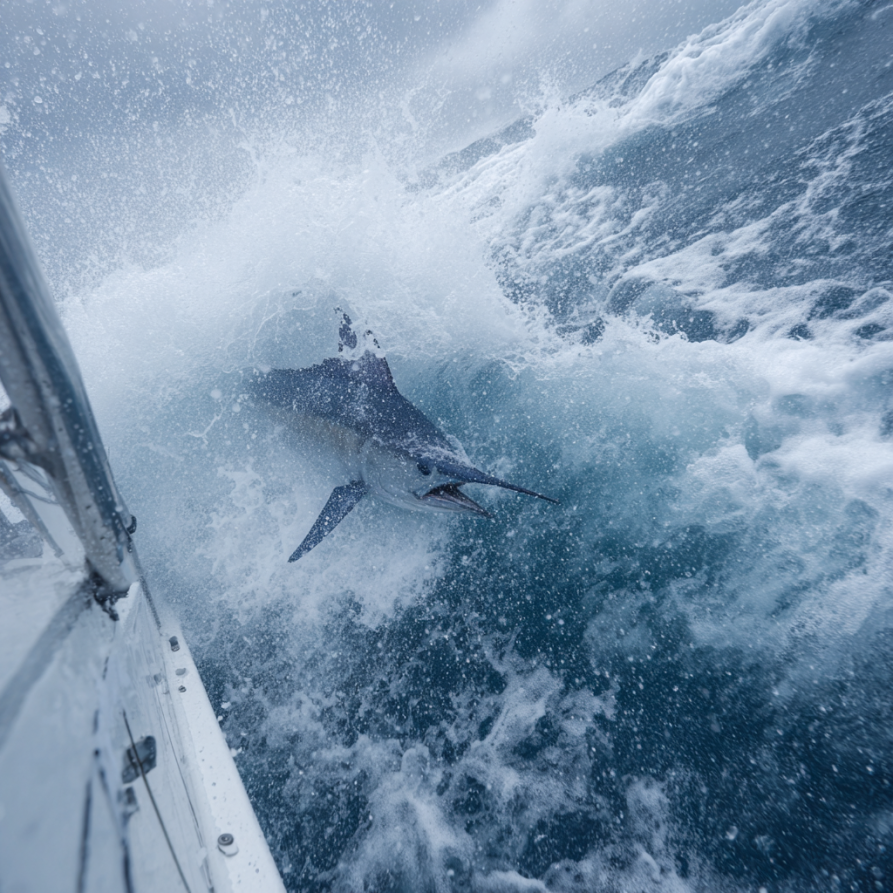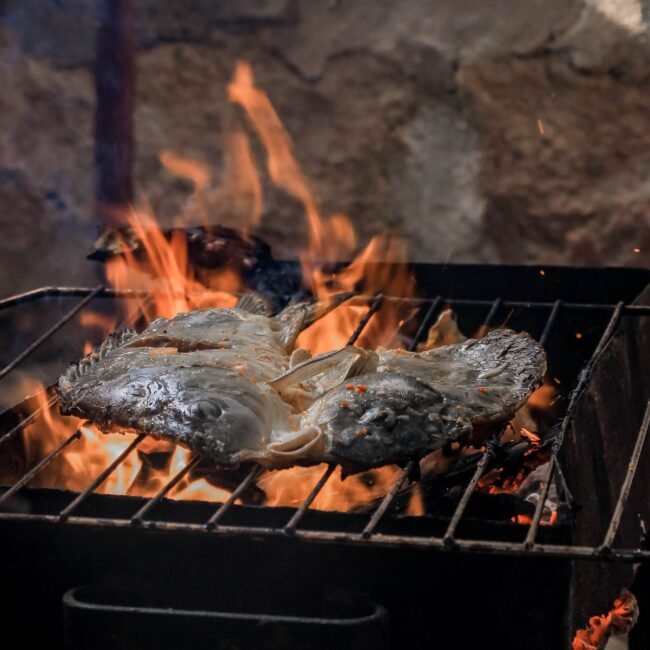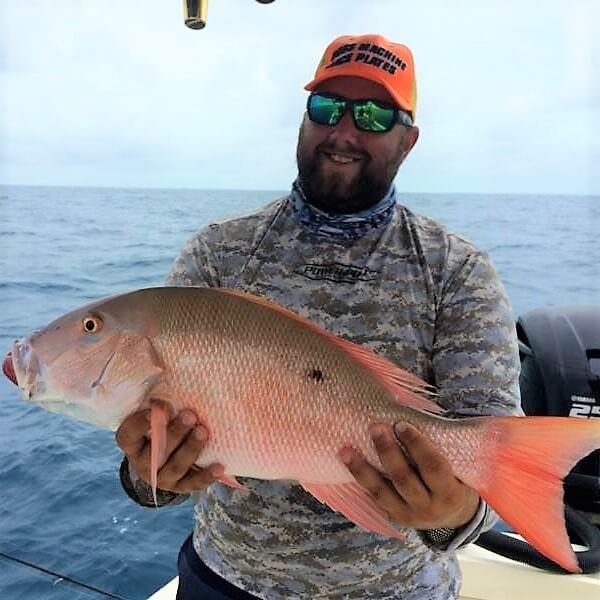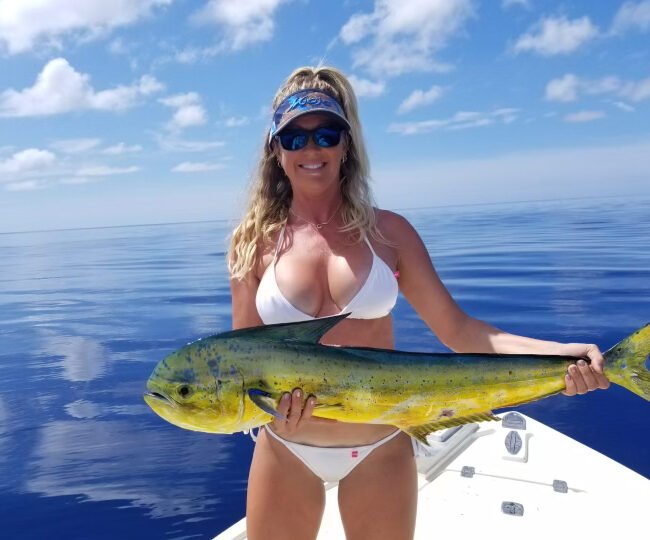
Phil’s gut tightened; this beast could sink them. Grabbing a gaff, he barked, “Get the heavy tackle—we hook it, or it sinks us!” The storm roared as lightning split the sky, the marlin’s shadow circling, a dark leviathan tied to their fate.
The sky over the Key West canyons was a bruised purple, swollen with the kind of storm that made even the gulls seek refuge. Captain Phil Pegley, a grizzled 52-year-old with salt-crusted beard and hands like oak roots, stood at the helm of his 24-foot Bay Boat, the Reef’s Reckoning. His first mate, Javier Ruiz, a wiry man with eyes sharp as fishhooks, scanned the churning sea. The Key West canyons, a jagged scar in the ocean floor 40 miles offshore, were notorious for their sudden squalls and monstrous fish. Today, the air crackled with unease, as if the ocean itself held a grudge.
Phil Pegley had fished these waters for three decades, but he’d never seen a day like this. The wind howled, whipping spray across the deck, and the boat pitched in the six-foot swells. They’d come for marlin, the ocean’s gladiators, but the weather had turned foul an hour ago. Phil was about to call it quits when Javier shouted over the gale.
“Phil! Starboard side—something’s hit us!”
Phil spun the wheel, his heart lurching as he felt the boat shudder. A grinding scrape echoed through the hull, not the dull thud of driftwood but something sharp, deliberate. He killed the engine and staggered to the starboard rail. There, embedded in the fiberglass hull just above the waterline, was a marlin’s spear—a three-foot blade of bone, glistening wet and quivering as if alive. The boat rocked, and the spear seemed to pulse, a wound in the Reef’s Reckoning’s side.
“What the hell…” Phil muttered, his voice lost in the wind. The spear was massive, bigger than any marlin bill he’d ever seen. Javier’s face paled, his eyes fixed on the water below. Bubbles churned, and a shadow loomed beneath the surface—a beast so large it seemed to warp the sea itself.
“It’s still here,” Javier whispered. “It’s stuck.”
Phil’s gut twisted. A marlin that size—450 pounds, maybe more—could tear the hull apart if it thrashed. But abandoning the boat in a storm this far from Key West was suicide. He grabbed a gaff, his hands steady despite the fear gnawing at him.
“Get the heavy tackle,” he barked. “We hook it, or it sinks us.”
Javier scrambled to the rod locker, pulling out a 130-pound-class rod and a reel spooled with 1,000 yards of braided line. The storm roared, lightning splitting the sky as rain lashed the deck. Phil leaned over the rail, peering into the abyss. The marlin’s shadow circled, a dark leviathan tethered to the boat by its own spear. Its eye broke the surface—a silver disc, unblinking, ancient, as if it knew their names.
Phil’s breath caught. This wasn’t just a fish. It felt like a reckoning.
Javier rigged the line with a 12/0 circle hook baited with a frozen mackerel. He cast it into the shadow’s path, the bait sinking into the froth. For a moment, nothing. Then the reel screamed, line peeling off so fast the spool smoked. The marlin surged, its tail breaking the surface in an explosion of foam, a 15-foot titan of muscle and fury. Its spear yanked against the hull, fiberglass cracking like gunfire.
“Hold the rod!” Phil shouted, grabbing the fighting belt and strapping it to Javier. The boat lurch as the marlin dove, dragging the bow down. Water sloshed over the gunnels, and Phil’s boots slid on the deck. He seized the helm, trying to keep the boat angled into the swells, but the marlin was a force of nature, towing them like a toy.
The fight began at 3:17 p.m., the storm’s heart bearing down. For the first hour, the marlin stayed deep, its runs stripping half the spool. Javier’s arms burned, sweat mixing with rain as he pumped the rod, gaining line inch by agonizing inch. Phil shouted encouragement, his voice raw, but his eyes kept darting to the spear in the hull. Water seeped through the crack, pooling in the bilge. The pump whined, struggling to keep up.
“Switch!” Phil yelled at the hour mark. He took the rod, his shoulders knotting as the marlin surged again. The line sang, slicing the air, and the boat spun in the current. Lightning flashed, illuminating the marlin as it breached 50 yards out—a silver-blue missile, its sickle tail slashing the sky. It crashed back into the sea, sending a wave that rocked the boat. Javier clung to the rail, his knuckles white.
“She’s a demon,” he gasped. “Never seen one this big.”
Phil grunted, his teeth gritted. The marlin’s spear had loosened but was still lodged, a constant threat. He couldn’t cut it free without risking a fatal breach in the hull. They had to land the fish, or it would take them to the bottom.
Hour two brought despair. The storm intensified, waves breaking over the bow. The marlin’s runs grew shorter but no less vicious, each one testing the line’s 800-pound breaking strength. Phil’s hands bled, the rod grip slick with blood and salt. Javier worked the reel, his face a mask of exhaustion. The boat’s bilge pump faltered, and Javier grabbed a bucket, bailing frantically as water sloshed ankle-deep.
“We lose her, we lose everything,” Phil said, his voice low. The marlin was tiring, but so were they. The sea was a chaos of foam and shadow, the horizon gone. Lightning struck a mile off, the thunder shaking their bones.
By hour three, the marlin surfaced closer, its flanks heaving. It rolled, showing a belly like polished steel, its spear still tethered to the boat by a splintered hull. Phil’s arms trembled, but he felt a flicker of hope. The fish was slowing, its runs weaker. Javier reeled, gaining 20 yards, then 30. The leader—a 400-pound monofilament—came into view, glinting in the storm’s eerie light.
“Gaff ready!” Phil shouted. Javier grabbed the flying gaff, a 12-foot pole with a barbed hook. The marlin thrashed, its tail slapping the water, but it was spent. Phil leaned over the rail, the rod bowed nearly to breaking. The fish’s eye met his again, and for a moment, time stopped. It wasn’t rage he saw, but something older—sorrow, maybe, or a warning.
Javier struck, the gaff sinking into the marlin’s shoulder. The fish erupted, nearly pulling him overboard, but Phil dropped the rod and grabbed the gaff line. Together, they hauled, their boots slipping in the flooded deck. The marlin’s spear tore free from the hull with a sickening crunch, water gushing in. Javier jammed a rag into the hole, cursing as he tied it off with a bungee.
Hour four was a blur of pain and desperation. The marlin was alongside, its body longer than the boat’s beam. They lashed it to the cleats, its tail still twitching. The storm began to break, the sky lightening to a sickly gray. Phil collapsed against the console, his chest heaving. Javier sat on the deck, staring at the beast they’d conquered.
The marlin was 450 pounds, maybe more, its spear alone worth a fortune. But as Phil looked at the shattered hull, the flooded bilge, and the blood on his hands, he felt no triumph. The fish’s eye haunted him, a mirror to something he couldn’t name.
The Ultimate Guide to Catch-and-Cook Restaurants in Tampa Bay That Prepare Your Fresh Fish
One of the best parts of fishing in Tampa Bay is enjoying the reward after the trip.
Fishing Charters For Business: Why Fishing Charters Create Bonds, Close Deals, and Reveal Who People Really Are
There is a quiet truth that people in business, politics and entertainment have known for a long time: if you really want to understand someone, take them out of their usual environment.
Preserving Your Catch After a Charter: Storing, Transporting, and Food Safety Tips For Your Fish
This guide breaks down the best ways to store, transport and prepare your fish so you get the most out of your catch without losing quality or risking food safety issues.
The Real Cost of Running a Fishing Charter: Fuel, Gear, Maintenance & Hidden Expenses
Understanding what it takes to operate a charter helps you appreciate the expertise, equipment, and effort that go into every trip.
Understanding Tampa Fishing Regulations in Florida: Bag Limits, Seasons, and Responsible Angling
Fishing in Tampa Bay is one of the great privileges of living in or visiting Florida. Redfish cruising the flats, Snook sliding under mangroves, Trout drifting over grass beds—these fisheries make t
What Fishing Tides Really Mean for Your Trip: Understanding Incoming, Slack, and Falling Tides
If you spend enough time fishing in Tampa Bay, you’ll hear captains talk about tides the way meteorologists talk about weather patterns. Tides are more than just a rise and fall of water; they’re
How Captains Locate Fish: Inside the Technology and Techniques Used on Modern Fishing Charters
Fishing in Tampa Bay isn’t just about tossing a bait into the water and hoping for the best. Modern charter captains rely on a combination of technology, instincts, local knowledge, and real-time en
Boat Etiquette 101: How to Be the Perfect Guest on a Fishing Charter
Stepping onto a fishing charter in Tampa Bay is more than just hopping aboard a boat and waiting for fish to jump into your hands. It’s entering a small floating community where teamwork, awareness,
The 7 Most Common Fishing Mistakes First-Time Charter Guests Make (and How to Avoid Them)
Booking your first inshore fishing charter in Tampa Bay should feel like a mini-vacation, not a pop quiz. You’re here to chase Redfish on the flats, tangle with sneaky Snook under the mangroves, and









